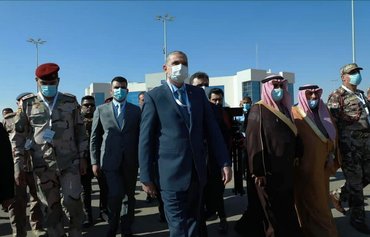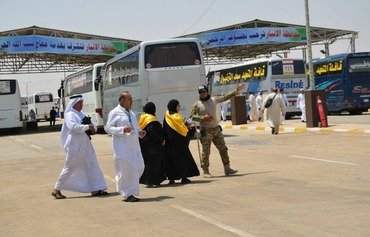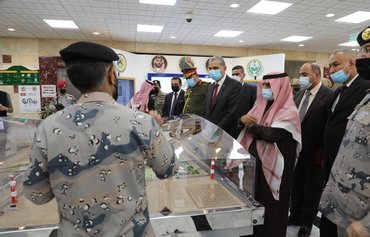Iraq is moving ahead with efforts to open the Jumaima crossing with Saudi Arabia, despite attempted obstruction by Iran-backed militias, officials said.
The crossing, which is expected to yield economic benefits for both countries, comes amid a warming of ties between the two neighbours.
Administrative and technical issues are still being worked out ahead of the planned opening of the crossing, which connects the Iraqi province of al-Muthanna to the Saudi province of Rafha, Iraqi officials told Al-Mashareq.
But Iraq is serious in its endeavour to open the crossing as quickly as possible, they said, following its reopening two years ago of the Arar crossing with its southern neighbour, three decades after its closure.
![Iraqi officials visit the Jumaima border crossing with Saudi Arabia last September 15 to follow up on plans for its opening. [Al-Muthanna province Facebook page]](/cnmi_di/images/2022/08/15/36681-jumaima-Iraqi-officials-600_384.jpg)
Iraqi officials visit the Jumaima border crossing with Saudi Arabia last September 15 to follow up on plans for its opening. [Al-Muthanna province Facebook page]
![An Iraqi security officer directs traffic for trucks at the Arar border crossing with Saudi Arabia on December 4, 2020. [Iraqi Customs Authority Facebook page]](/cnmi_di/images/2022/08/15/36682-Arar-border-crossing-600_384.jpg)
An Iraqi security officer directs traffic for trucks at the Arar border crossing with Saudi Arabia on December 4, 2020. [Iraqi Customs Authority Facebook page]
There are a number of economic benefits to be derived from the opening of the Jumaima crossing, according to Haider Mohammed al-Wahami, economic adviser to the al-Muthanna governor.
The crossing will be a key gateway for trade between the two countries that will create job opportunities for thousands of al-Muthanna residents, he said, as well as those of neighbouring provinces.
It will serve as an "essential tributary" to revive cities along the route through the establishment of development projects to boost local economies, open investment opportunities and stimulate tourism and travel activity, he said.
Plans move forward
In March 2021, Iraq announced it was developing a plan to complete the work on the border crossing and operate it using modern technology, with the participation of all concerned ministries and authorities.
This came after a special committee from the office of Prime Minister Mustafa Kadhemi visited the crossing and discussed the implementation of the plan with al-Muthanna province officials.
At the time of the visit, special committee chairman Safaa Mohammed said the government was keen to open the border crossing as soon as possible to develop the economy of al-Muthanna -- the poorest of Iraq's provinces.
A ministerial committee had been formed, comprising members of the local government, the Border Crossings Authority and the National Intelligence Service, al-Muthanna governor Ahmed Manfi Judeh told media outlets.
This group has been tasked with developing an economic and technical feasibility study for opening the border crossing, with the Border Crossings Authority allocating 500 dunams of land to the project.
The ministerial committee took it upon itself to get the project started and to equip the crossing with infrastructure and services such as water, electricity and roads, said al-Wahami.
Meanwhile, efforts and communications continue at the diplomatic level through the Iraqi and Saudi foreign ministries, he added.
Economic advantages
The crossing provides many advantages, including speed in transporting goods between Iraq and Saudi Arabia, as it is only 250km from the al-Muthanna provincial capital of Samawa, said the town's mayor, Ali Mikhlif.
The crossing is just 92km from the town of Nuqrat al-Salman in the Samawa desert, he said.
The shortcut means lower cross-border transport costs and ease of group travel for pilgrims and travellers, he said, pointing out that via this route "it takes only five hours to reach Medina by land from the border crossing".
The efforts to open the border crossing come in context of the Iraqi-Saudi rapprochement that began in 2015, when the kingdom reopened its embassy in Baghdad after 25 years.
Reciprocal visits by delegations from the two countries followed, along with the formation of a joint business council, and discussions for co-ordination and co-operation that culminated in various economic agreements.
The volume of trade through the Arar crossing in 2020 increased by 15% over the previous year, amounting to more than $1 billion.
Commitment to security
Iran regards the Iraqi-Saudi rapprochement as a threat, observers said, and continually pushes its proxies to threaten the growing relations between those neighbours to weaken the Iraqi economy and strengthen its own, pummeled by sanctions.
In September, sources told Asharq Al-Awsat that vehicles carrying militants linked to Iran-backed Iraqi militias had been observed deploying in the Samawa desert and establishing barracks and military headquarters there.
This unusual activity came amid reports of an Iraqi-Saudi understanding regarding the Jumaima border crossing, and was seen as a warning and an attempt to block its opening.
In response, Iraqi border guard and army and al-Muthanna police forces affirmed their commitment to protecting the areas surrounding the border crossing and the road leading to it from Samawa.
Military operations take place regularly to assert control over the desert and to secure the border strip with Saudi Arabia, these forces said.

![A road leading to the Jumaima border crossing with Saudi Arabia is seen here, on the Iraqi side of the frontier, in a photo posted online on June 16, 2021. [Al-Muthanna province Facebook page]](/cnmi_di/images/2022/08/15/36680-jumaima-border-crossing-600_384.jpg)






